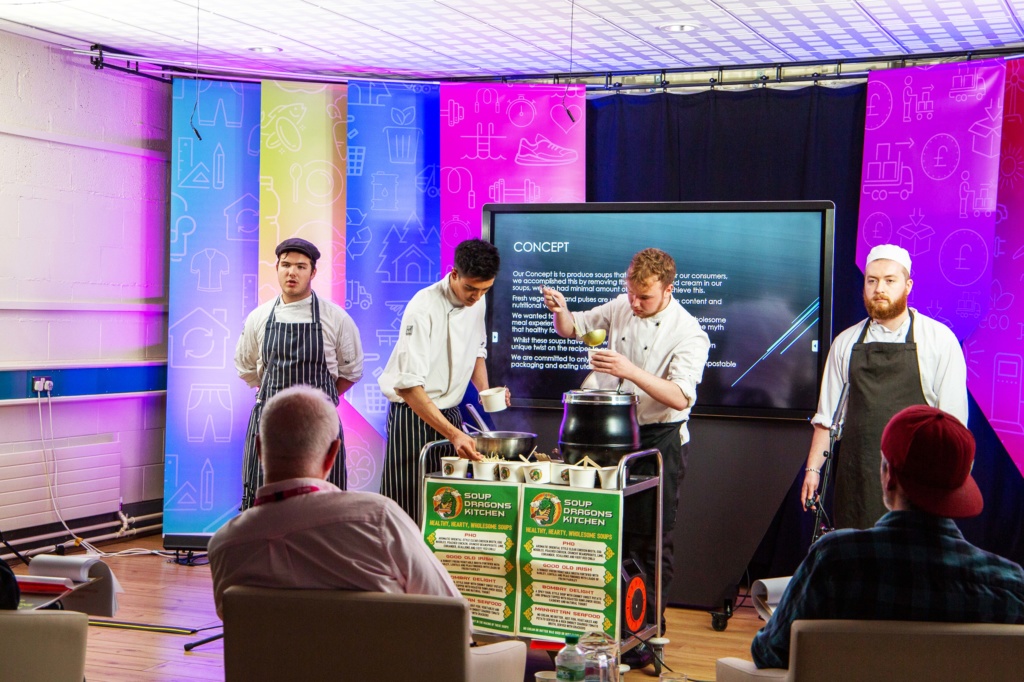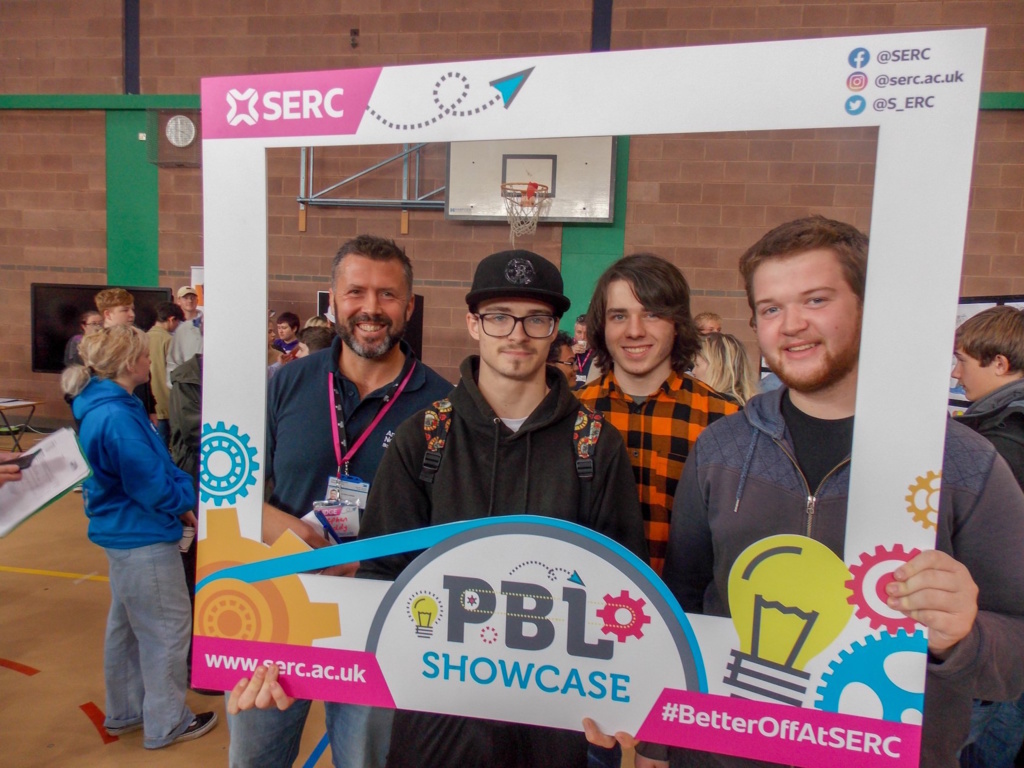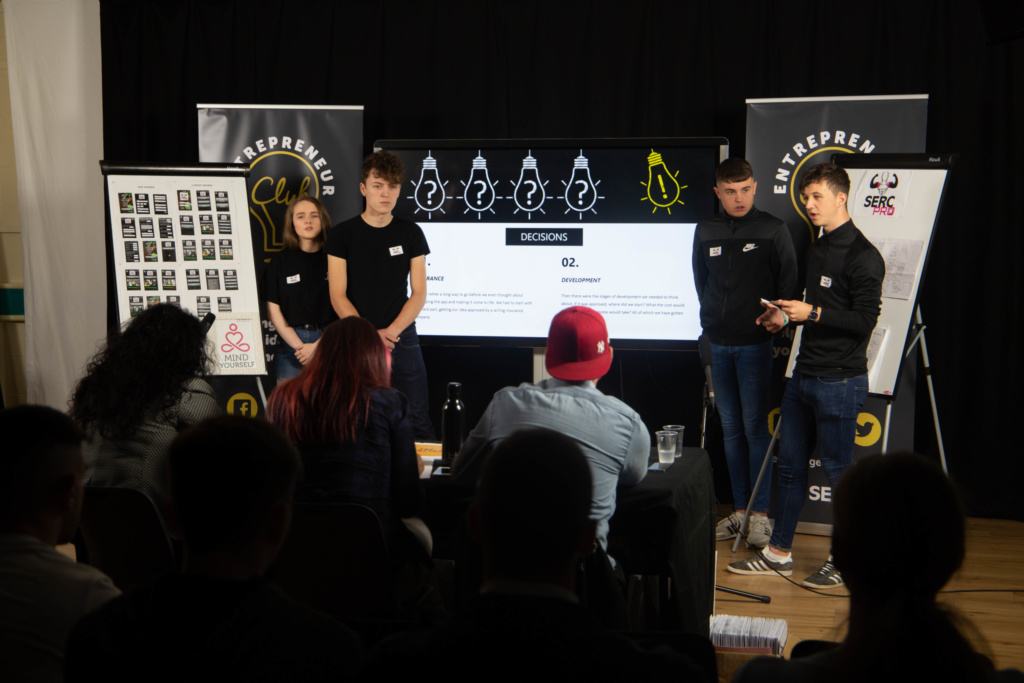
Generations are shaped by the context into which they are born, and in the current era of unprecedented change, students face a shifting landscape. This requires a transformational approach within education. The gap between student skills and industry needs, make it increasingly important to ask, what is worth learning?
Traditional educational systems have been grounded in language, logic and recall. However, the world no longer rewards people simply for what they know, but for what they do with what they know. Does our education system hit the target but miss the point?
Education should be more than just ‘pushing’ information, exams, timetables etc. onto students. We need to create agency in learning, ‘the pull’, engaging our students in real-world challenges that are related to industry and community. Our students need to develop professional and technical skills, as well as a range of wider transversal skills to allow them to prosper in an era of unprecedented change.
At South Eastern Regional College (SERC), there has been a significant shift in how education is received and perceived. The introduction of Project-Based Learning (PBL) across the College has been a catalyst for change. SERC have created a PBL model that is based on Stanford’s CDIO initiative and the challenge-based learning model in the Basque region. Our PBL model provides a context for all learners to work in multidisciplinary, collaborative projects, preparing students for the experience they will have in industry. These projects help students build skills, habits and knowledge that will help them thrive in an unknowable future.
Education is becoming more about ways of thinking: that is a critical differentiator for learners today. Starting from questions, rather than knowledge, we recognise that we need to engage our students. Developing the whole learner means considering the skills, attitudes, behaviour, experience and qualifications they need to succeed in the world of work.
Delivering a holistic curriculum is a team effort, requiring policy makers, educators, entrepreneurs and awarding organisations to support an innovative education system. As active agents of change, teachers may need to unlearn what they learned at school and relearn a new approach to education.
SERC have identified six critical skills for staff:
- Professional skills
- Digital skills
- Pedagogical skills
- PBL skills
- Collaborative skills
- Critical thinking skills
SERC have invested in staff development and peer mentoring to support teachers as they deliver this innovative approach.
As educators, we want to consider what needs to change. The shifting landscape provides challenges which may spark innovation and new ways of working. SERC have used these imperatives for change, to re-shape the learning environment and the learner experience. PBL has been a catalyst for changing the culture and mindset of students and staff, with activities such as Enterprise Fortnight, Project-Based Learning, Entrepreneurs’ Club, Student Companies, Student Fairs and competitions all contributing to an enriched curriculum.
Project-Based Learning (PBL)
Engaging learners in real-world challenges that are relevant to the industry they want to enter and the community they are part of means that they see the relevance of their studies while they are developing the skills, knowledge and behaviours needed to succeed. SERC’s bespoke PBL model is based on principles which provide opportunities for students to become agile learners. Traditionally, education works on the principle that you must wait until the end of your course for the pay-off. In SERC, our learners see the pay-off from the outset and are encouraged to develop the aptitude and confidence to tackle real-world challenges—a crucial skill for any employee. PBL provides an environment where students can work collaboratively, address conflict, resolve disputes and persevere to find a solution to the challenge set. The College’s PBL activities, therefore, inspire students to take measured risks to achieve an innovative solution, while ensuring these challenges are mapped to the curriculum and assessed in a way that harnesses naturally occurring evidence and further develops wider digital skills.

Teaching transformed
Teachers are active agents for change and moving to a PBL approach has necessitated a culture shift. SERC has encouraged innovation, assessment across modules, work on interdisciplinary industry challenges, and digital technology to rethink the way in which we work and teach. For example, performing arts and engineering students may work alongside computing students on a real-world project, reflecting the experiences in industry. This focus on enterprise and project-based learning has seen horizons expand and enhanced the skills of students and staff.
In June 2015 a group of staff, including senior and middle managers from a range of curriculum areas, participated in a three-day ‘train the trainer’ programme on PBL which was facilitated by Tknika Centre of Research and Applied Innovation. This led to the creation of the College’s own bespoke PBL model. These staff trained all curriculum managers, who in turn trained all teachers during college-wide staff development in August 2016.
Staff are supported through SERC’s Learning Academy by our award-winning pedagogy mentors, empowering staff to be creative and innovative in how they shape learning and teaching. Face-to-face workshops, classroom sessions and synchronous and asynchronous learning opportunities empower staff as they develop the mindset, skillset and toolset to implement the PBL approach. SERC’s weekly webinars showcase and share good practice across the organisation; Moodle Mondays (sharing ideas around blended learning), Webinar Wednesdays (sharing good practice across the organisation) and One-Minute CPD (digital microlearning) are used to encourage communication, collaboration and independent learning.
Scaffolded support is provided by the mentors to implement PBL. Mentors teach, team-teach and peer support mentees as they implement these new approaches. At SERC more than 500 staff have completed the mentoring programme, many on more than one occasion. This unique approach focuses on the impact of professional practice on students’ learning. Harnessing the student voice, 360-degree feedback shapes the bespoke training. Students identify approaches which help them learn during each classroom session, thus strengthening the link between staff development and the learner experience.
Intensive training is provided over two weeks for curriculum teams, where they work with mentors to plan their projects for the year ahead. Staff prioritise PBL planning and mentors encourage curriculum teams to expand their project scope. This intensive training is also used to engage with stakeholders, thereby generating real-world projects which are meaningful, engaging, and linked to tangible outcomes. Liaising with awarding organisations during this period ensures curriculum teams have clarified the PBL assessment and how the evidence will be gathered.
Harnessing innovation in the changing digital landscape has seen an increased emphasis on developing digital technologies such as virtual and augmented reality and 3D modelling. Collaborative tools (e.g. Microsoft Teams) create opportunities for staff and students to share ideas and research. SERC’s Learning Academy support the development of PBL, Technology Enhanced Learning (TEL) and pedagogical skills.
The transition from traditional pedagogical approaches to PBL does not happen overnight, rather it develops incrementally. A significant investment in staff time and commitment to planning year on year is needed. Buy-in by senior management has been crucial both in the short and longer term and SERC’s management team have been committed to the development of PBL over time.
An agile approach to continuous professional development (CPD) is needed to support staff with differing skills and attitudes to the change been proposed. Staff need to unlearn a range of deeply embedded pedagogical approaches before they can make the effective transition to PBL. The teacher becomes the facilitator and the students are expected to learn while doing and this can be initially difficult for both teacher and students. Colleges must prioritise learning, with accreditation as a byproduct of the learning. Agreeing approaches with awarding organisations in advance has been an important and significant step for us at the planning stage.
Enterprise Fortnight
PBL principles are embedded in all courses from the outset of the academic year, enabling students to perceive the direct link from their learning to the world of work. SERC students start the year with Enterprise Fortnight, working collaboratively on industry challenges facilitated by teachers.
Students are strategically grouped based on the results of the SERC’s Ingenio App. This software, which was developed in SERC, helps students identify their own learning traits and how they can best harness these within a group.
Divergent thinking and group research enable students to come up with several solutions. Thinking critically, students narrow these options to one proposal. Students upload these to the enterprise portal. All students can vote for the best solution against a range of criteria: innovation, creativity, team working and presentation. Students also present their proposals at the SERC Student Expo, receiving feedback not only from their peers, but also from internal and external judges. SERC has seen the benefits in terms of improved critical thinking, collaboration and increased agency in learners.
The winners of Enterprise Fortnight in 2017-2018 had developed an idea to create a mobile food truck to cater at external events. To support this, SERC invested in a trailer and challenged engineering students to create a food truck. This was a PBL activity for motor vehicle, engineering and catering students. ‘The College Kitchen’ was launched. It is a bespoke mobile food truck that can trade under different names, depending on the specific customer requirements. Students can transform the food truck based on the event needs, for example: a traditional burger van, Mexican food truck or even a breakfast bar. The commercial success of ‘The College Kitchen’ has provided a range of real-world experiences for this multi-disciplinary team.
Following Enterprise Fortnight, students are encouraged to implement their project by setting up a business. In 2018–2019, 32 student companies were created. Each of the SERC ‘Enterprises’, ‘Start-ups’ and ‘Innovation Projects’ receive bespoke mentoring in the Entrepreneurs’ Club to facilitate the swift progression from original idea / concept to ‘market’. Tailored training includes mentoring in: design and development, use of analytics for monitoring markets, identification of trends and opportunities. Innovative projects and companies are assisted by the Entrepreneurs’ Club where proof of concept is required to prototype and test their product/service. Supported by mentors, teams are encouraged to showcase their product/service to industry specialists and at local and regional competitions. Competitions also raise the profile of the business idea and can attract the interest of angel funders.
Regular pop-up events give students the opportunity to prepare their marketing strategies while increasing their awareness of financial operations. Students can trade goods and services at specific seasonal events, monthly internal fairs, local craft markets and online. Over half of the 32 companies started in 2018-2019 are now trading independently.

Case Study: Improving Safety for the Fishing Industry
‘Advanced Numerical Control Panel Operating System’ (ANCPOS) is an outstanding example of how SERC’s PBL model is successful. The ANCPOS project team designed a device to safeguard the lives of fishing trawler personnel when casting nets, which is an activity with inherent danger. This innovative concept included the development of a computer program that uses several algorithms to automatically monitor and adjust net rope characteristics, including stretch, during the casting process. This negates the need for manual alteration, thus eliminating human error from the process and reducing the risk of death or injury.
The ANCPOS team needed to develop and test a prototype to get proof of concept. It was also crucial at this stage to gauge industry backing for the product. Supported by a mentor, the team began to build a network of relevant external stakeholders. Experts from the fishing industry noted that this concept could be instrumental in saving lives and hence added their support.
ANCPOS secured a funding investment of £1000 from the Northern Ireland Fisherman’s Safety Forum and The Northern Ireland Fish Producers’ Organisation. With access to SERC’s specialised industrial engineering equipment, they used the funding to build a prototype which was trialled at sea. This trial identified some failings in the system and used the data to identify areas of development. At this vital stage, further funding was required. £3000 of funding was secured from ‘The Walney Community Fund’, backed by a proposal from The Northern Ireland Fish Producers’ Organisation. This enabled the development from desktop to full-size model.
The project team participated in a regional competition ‘Invent NI’ and successfully progressed through to the semi-finals. ANCPOS were the only representatives from a Further Education College competing against university graduates and PhD students. The feedback ANCPOS received from the panel and the audience has given them the confidence to progress to the next stage. The overall experience has developed their employability skills and resilience, and has sparked an entrepreneurial and creative mindset. For the students, being involved in PBL and having tailored support has created a sense of pride in their significant achievements.
The Entrepreneurs’ Club
SERC established the Entrepreneurs’ Club in 2018, which supports students and alumni who want to set up or develop their own company/project. SERC’s Entrepreneur in Residence, Professor Terence Brannigan, has global experience and a passion to help young people achieve their ambitions. He mentors and coaches students to help them develop their ideas and skillsets. Using an international network and his own experience, Prof Brannigan helps to drive innovation and creativity among our students. Within the Entrepreneurs’ Club, some students offer their time to support current companies to further develop their ideas. This approach benefits both the student company and the individuals volunteering their time. Momentum for this initiative is growing.
SERC has provided training and support to education institutions in the UK, Europe and Asia to help them innovate within their context. This has shown the transferability of the approach used by SERC and ensured an international dimension in the curriculum. Students are currently working on PBL projects with learners in other Colleges in the UK. If you would like further information on SERC’s approach to innovation in education contact the Learning Academy at learningacademy@serc.ac.uk.
Register for free
No Credit Card required
- Register for free
- Free TeachingTimes Report every month